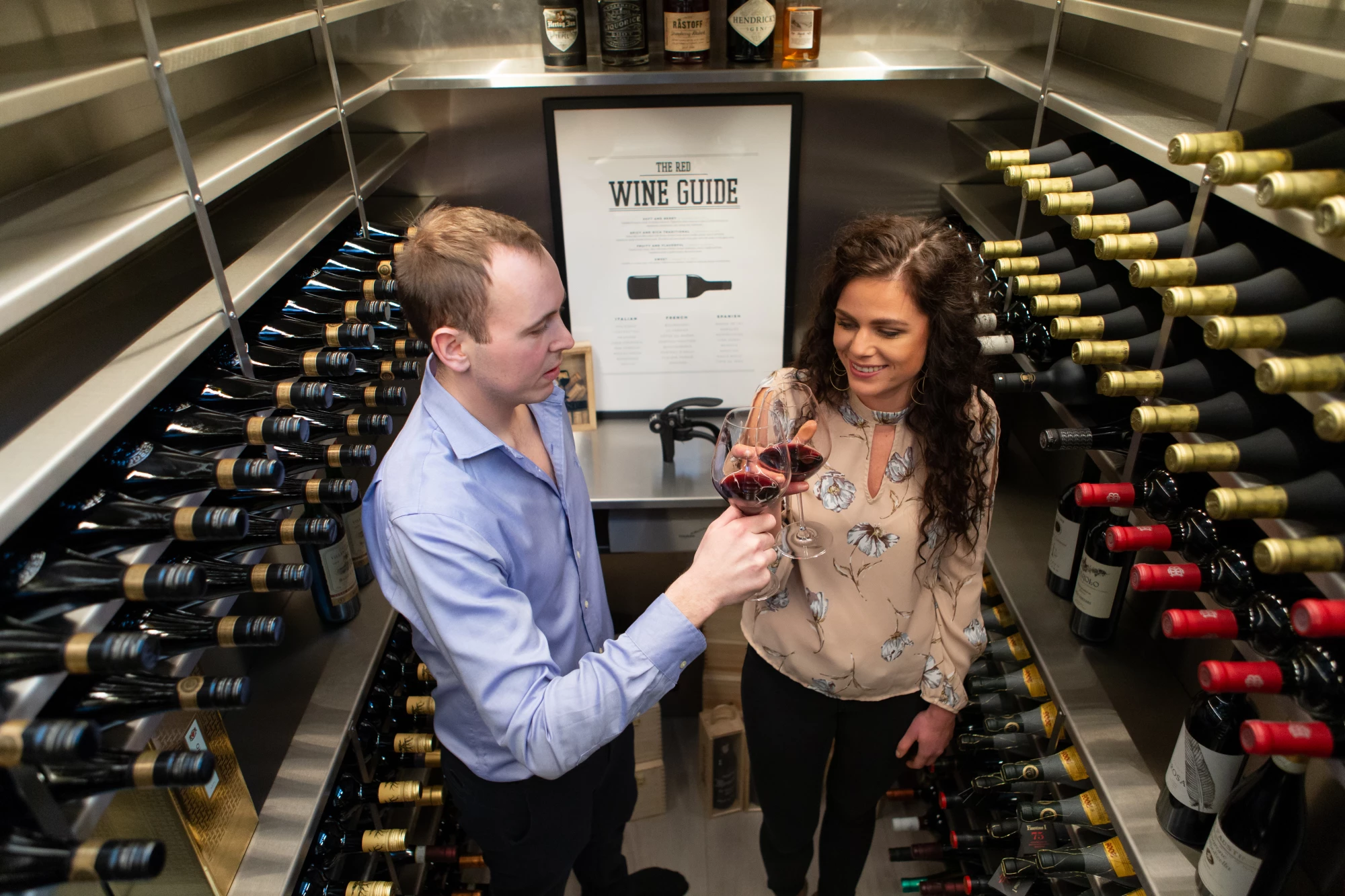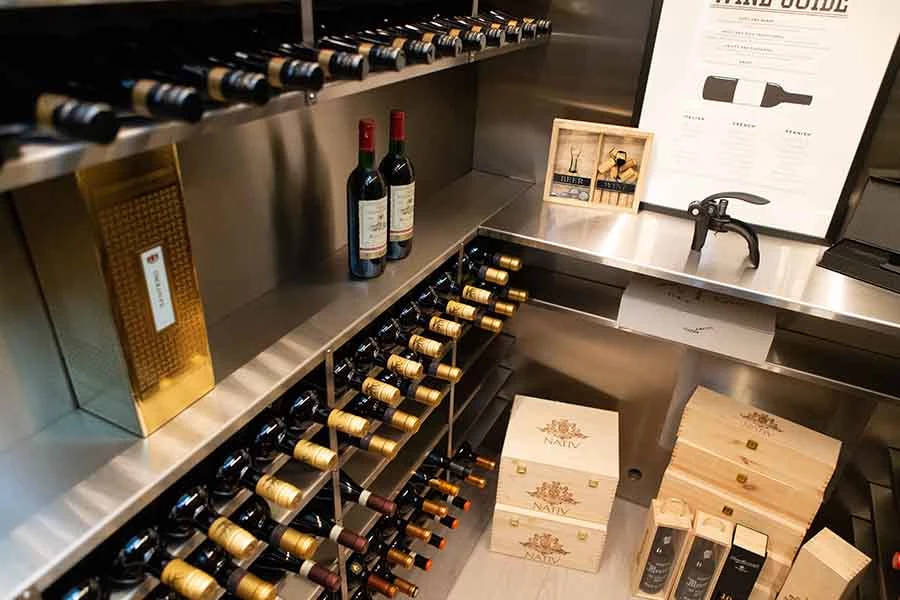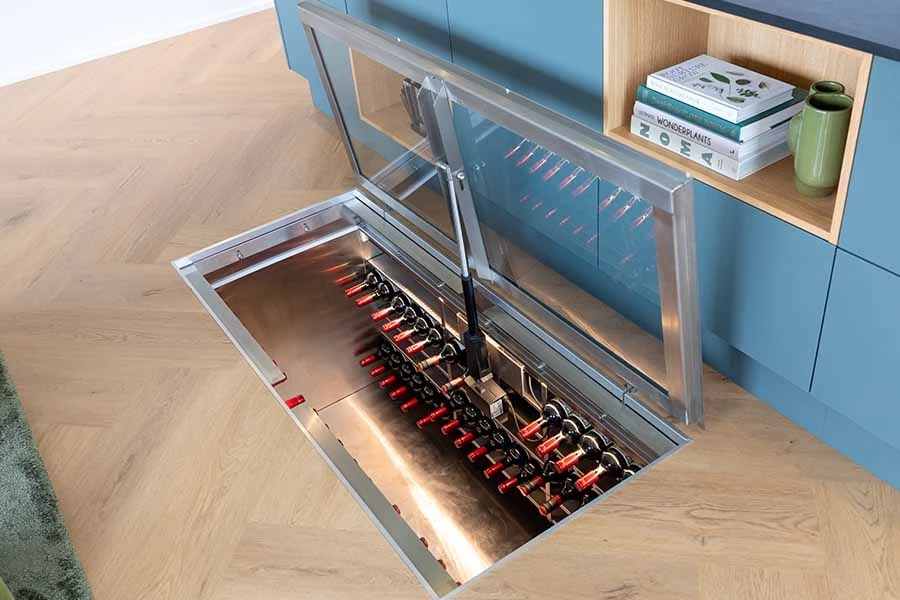Wine Cellar humidity
Wine Cellar humidity plays a crucial role in the development and storage of wine. Both too high and too low humidity can lead to undesirable effects, affecting the wine's taste and quality. In this guide, we will look at why it is so important to maintain the right humidity in the wine cellar and how you can create the best conditions for your wines, ensuring they retain their optimal quality over time.

How humidity affects wine storage
Humidity plays a crucial role in how your wine is stored and develops over time. If the humidity is too low, it can cause the corks on the wine bottles to dry out. This can create small cracks in the cork, allowing air to enter the bottle, which can lead to oxidation of the wine and negatively affect both its taste and quality.
On the other hand, if the humidity is too high, it can lead to mold growth on the corks and labels, as well as the formation of moisture on the bottles, which can cause bad odors and an unpleasant experience when you open the bottle. Additionally, it can damage the labels, making the bottles less attractive to collectors and giving a bad impression of the wine’s quality.
To avoid these problems, it is important to maintain a stable level of humidity in the wine cellar. It is recommended that the humidity be kept between 50-80% to ensure that the corks remain in good condition and that the wine is stored under ideal conditions. This provides both the wine and the cork with the necessary protection to prevent damage to the bottles and ensure that the wine matures properly.
By monitoring and controlling the humidity, you can extend the wine’s shelf life and preserve its quality throughout the storage process. This is especially important for wine bottles that are to be stored for many years, as the right humidity helps preserve the wine’s aroma and taste over time.
The humidity in our wine cellars
The humidity in our wine cellars are affected by the surroundings they're placed in, particularly the soil and ground. The humidity in a wine cellar can vary depending on location, and these factors are beyond our control. For example, a cellar in soil with high natural humidity will benefit from a higher humidity level, which is ideal for wine storage. However, if the cellar is placed in dry conditions or on poorly insulated ground, the humidity may be too low, which can lead to issues for wine storage.
A wine cellar built below ground or in a naturally cool area may experience higher humidity, as the ground acts as a natural moisture source. In drier climates, the ground may draw out moisture, making it harder to maintain stable humidity. Therefore, it’s important to consider the soil type and location of the cellar to ensure the humidity is suitable for wine storage.
For wine cellars in contact with soil, we can’t always control the humidity in the same way as with those that have mechanical moisture control. It’s crucial to consider the cellar’s location and any natural factors that might affect both temperature and humidity. A cellar in a high-humidity area is ideal for long-term storage, while a cellar in a dry area may require extra measures to ensure humidity remains stable.
We recommend regularly monitoring the environment around your wine cellar, especially if it’s located below ground or in an area with fluctuating humidity, to ensure the best storage conditions for your wine.

Common mistakes people make with humidity in the wine cellar
Maintaining the correct humidity in your wine cellar is crucial for preserving wine quality. Many wine enthusiasts make common mistakes that can affect the wine’s condition and durability. Here are some to avoid:
- Too high humidity: Humidity above 80% can cause mold, odors, and damage to labels and corks. This leads to leaks and oxidation. Use a dehumidifier or ensure proper ventilation to control humidity.
- Too low humidity: Humidity below 50% can dry out corks, allowing air to spoil the wine. Maintain a stable level of 60-70%. A humidifier can help stabilize it.
- Poor ventilation: Insufficient airflow can cause moisture buildup, mold, and poor air quality. Ensure your wine cellar is in a well-ventilated space to prevent these issues.
- Incorrect placement: Avoid placing the wine cellar near windows or heat sources where temperature fluctuations can damage the wine. Choose a stable, temperature-controlled location.
By avoiding these common mistakes people make with humidity in the wine cellar, you can create an optimal storage environment for your wines, ensuring they remain in perfect condition for years.
Other factors that affect the quality of wine in the wine cellar and how to avoid them
To ensure your wines are stored optimally, it is important to pay attention to several factors such as temperature, light, vibrations, and the placement of the wine cellar.
1. Temperature
Some wines should be stored at a consistent temperature between 10-15°C to avoid damaging the cork and the wine’s quality. Use a wine fridge or wine cellar with temperature control to maintain stable conditions.
2. Light
Direct sunlight and UV rays can damage the wine’s taste and aroma. Make sure the wine cellar is dark, or use shelves with glass doors that filter out UV rays.
3. Vibrations
Vibrations can disrupt the wine’s development and affect the taste. Place the wine cellar in a location with minimal vibration, and ensure the shelves are stable.
4. Placement
Choose a well-ventilated room with controlled temperature and humidity, and avoid heat sources nearby to maintain stable conditions.
It is important to be aware that different types of wine have different needs when it comes to storage. While some wines can be stored under relatively simple conditions, more expensive or delicate wines may require specific conditions to retain their quality. For valuable or rare wines, we recommend consulting a wine expert for detailed advice on temperature, humidity, placement, and other crucial factors for preserving the wine’s quality in the long term.
By considering these factors, you can ensure your wines are stored under optimal conditions and develop in the best possible way.

Contact us for assistance with your wine cellar
Are you unsure about which wine cellar is best for your needs, or do you have questions about how the wine cellar can optimize storage conditions for your wines? Don't hesitate to contact us! Our experienced team is ready to provide you with advice and guidance, so you can make the best choice for both wine storage and decoration. We are happy to assist you with anything we can.
